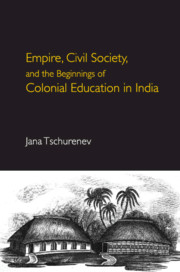Book contents
- Frontmatter
- Dedication
- Contents
- List of Figures
- List of Tables
- List of Abbreviations
- Acknowledgements
- Introduction: Empire Civil Society, and Educational Transformation in India
- 1 A Colonial Experiment in Education, Madras, 1789–1796
- 2 Education of the Poor, 1805–1813
- 3 Missionaries, Empire, and the Cause of Universal Education, 1792–1824
- 4 Race, Class, and Gender: The Social Agenda of Education, 1809–1830
- 5 Rules and Numbers: Transforming Rural Education, 1814–1830
- 6 Intellectual Conquest: Education Societies, ‘Useful Knowledge’, and the Bengal Renaissance, 1817–1854
- 7 Civil Society, Government, and Educational Institution-Building, Bombay Presidency, 1819–1882
- 8 Teaching the Marginalized: Universal Education and the Politics of Inequality, 1789–1937
- Conclusion: The Emergence of Public Elementary Schooling in an Imperial Frame
- Bibliography
- Index
2 - Education of the Poor, 1805–1813
Published online by Cambridge University Press: 26 April 2019
- Frontmatter
- Dedication
- Contents
- List of Figures
- List of Tables
- List of Abbreviations
- Acknowledgements
- Introduction: Empire Civil Society, and Educational Transformation in India
- 1 A Colonial Experiment in Education, Madras, 1789–1796
- 2 Education of the Poor, 1805–1813
- 3 Missionaries, Empire, and the Cause of Universal Education, 1792–1824
- 4 Race, Class, and Gender: The Social Agenda of Education, 1809–1830
- 5 Rules and Numbers: Transforming Rural Education, 1814–1830
- 6 Intellectual Conquest: Education Societies, ‘Useful Knowledge’, and the Bengal Renaissance, 1817–1854
- 7 Civil Society, Government, and Educational Institution-Building, Bombay Presidency, 1819–1882
- 8 Teaching the Marginalized: Universal Education and the Politics of Inequality, 1789–1937
- Conclusion: The Emergence of Public Elementary Schooling in an Imperial Frame
- Bibliography
- Index
Summary
In that general and moral view […] ignorance in the lower orders is beheld the cause of their vice, irreligion, and consequent misery.
Improvements in Education in London
Andrew Bell's colonial Experiment in Education was not the only source of the monitorial system of education. Five years after Bell had published his book – which, till then, had been ‘buried in obscurity’ – the young London schoolmaster Joseph Lancaster (1778–1838) gave an account of some educational ‘improvements’ which closely resembled Bell's innovations. And this publication proved to be highly influential. Lancaster introduced it as an appeal to the public to engage with the reform and expansion of the education of ‘the industrious classes of the community’. He pointed at the deficiencies of the ‘current system’ in vivid terms: the ‘woefully insufficient’ schools for the working poor, he said, displayed ‘disgusting scenes of noise and riot’. The limited time these children had for gaining the rudiments of moral, religious, and intellectual instruction before they entered their working lives was wasted. The worst treatment was given to the ‘poor oppressed children in the work houses’, who were not offered the least chance for moral improvement. This deficient education did not only produce ‘desolating effects’ on the individual children. In the end, ‘national benefit’ was lost. A ‘national evil’, Lancaster argued, required a ‘national remedy’. So far, a ‘sect-making spirit’ had prevented society from fulfilling its duty towards the very class of people which with its labour produced the wealth of the nation. This unhappy spirit, the young Quaker Lancaster urged, had to be overcome: ‘let the public good become the sole object of your united Christian effort.’
Lancaster did not only point to the necessity of improving the education of the poor, he also suggested the means to do so: the formation of an interdenominational voluntary association. The task of this association was to bring the existing schools under its supervision, train masters and mistresses, and provide manuals for improving the conduct of the schools. ‘Proper regulation’ and ‘proper management’ would turn the schools for the labouring poor towards ‘real usefulness.’ A regular ‘instruction of youth in useful learning, adapted to their respective situations’, and in the ‘undisputed doctrines’ of Christianity would highly contribute to a ‘promotion of good morals’ and, thereby, to the ‘improvement of society’.
- Type
- Chapter
- Information
- Publisher: Cambridge University PressPrint publication year: 2019



